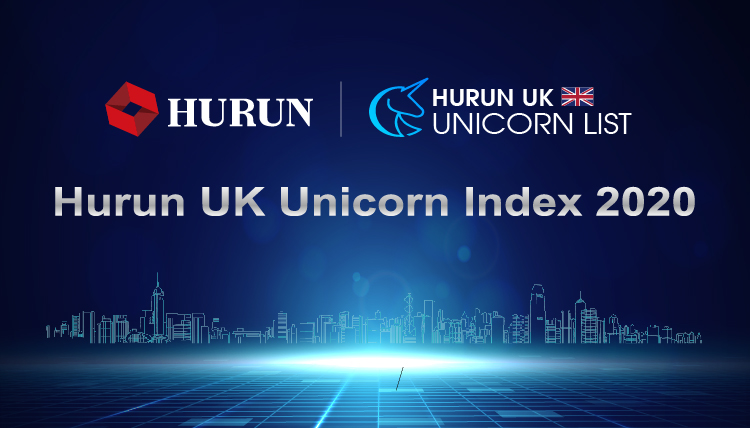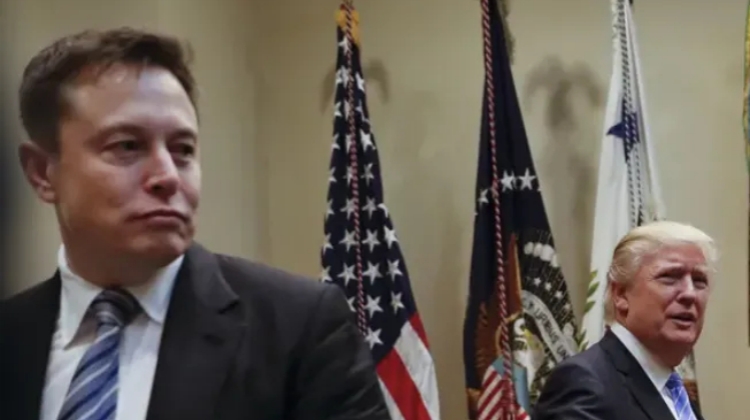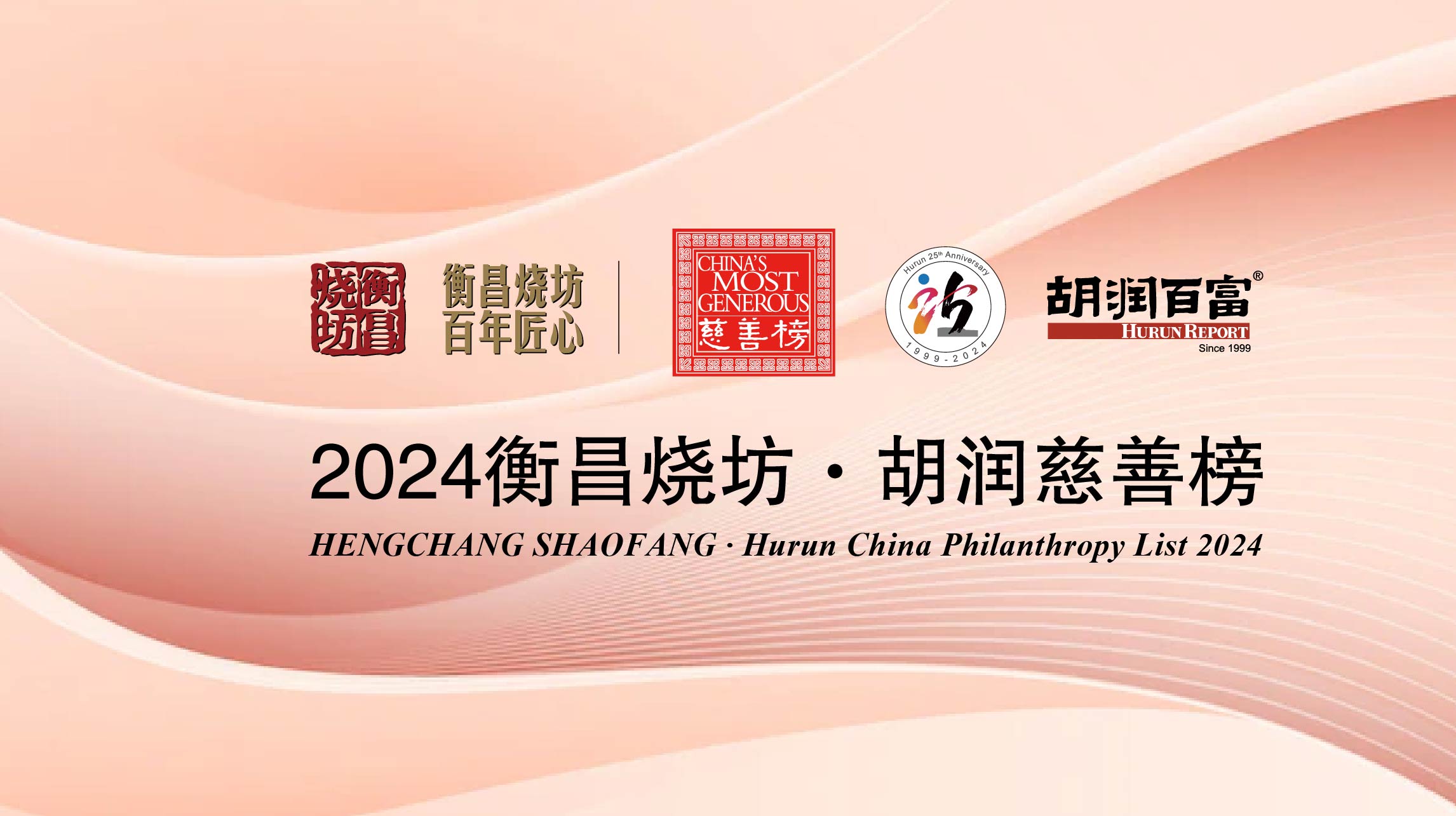Hurun UK Unicorn Index 2020
The Hurun Research Institute today released the Hurun UK Unicorn Index 2020.
HURUN UK UNICORN INDEX 2020
HURUN RESEARCH FINDS 24 UNICORNS IN UK, UP 11 ON LAST YEAR
UK’S TOP 3 UNICORNS: DIGITAL BANK REVOLUT, WORTH US$6BN, E-COMMERCE PLATFORM THE HUT GROUP, WORTH US$5BN, AND FOOD DELIVERY APP DELIVEROO, WORTH US$4BN.
UK 3rd IN WORLD FOR UNICORNS, AFTER USA AND CHINA, AND AHEAD OF INDIA.
UK MAKES UP 40% OF EUROPE’S UNICORNS. “THE UK HAS MORE UNICORNS THAN GERMANY, FRANCE, SWEDEN, SPAIN, ITALY, RUSSIA, POLAND AND HOLLAND COMBINED”, SAID RUPERT HOOGEWERF, HURUN CHAIRMAN AND CHIEF RESEARCHER.
LONDON WITH 16 UNICORNS, ONLY NON-CHINA AND NON-USA CITY IN TOP 10 CITIES OF WORLD’S UNICORNS. BEIJING IS WORLD CAPITAL OF UNICORNS WITH 93, FOLLOWED BY SAN FRANCISCO WITH 68. BRISTOL AND CAMBRIDGE EACH HAVE 2.
FINANCIAL SERVICES, HEALTHCARE AND LIFE SCIENCES MOST DISRUPTED BY UK UNICORNS
FINTECH LED WITH 10 UNICORNS, FOLLOWED BY AI WITH 3 AND HEALTHTECH WITH 2
YOUNGEST UNICORNS BRISTOL-BASED GRAPHCORE AND LONDON-BASED RAPYD, BOTH FOUNDED IN 2016. AVERAGE AGE OF UK UNICORNS 8YRS
18 OF 24 UNICORNS CO-FOUNDED BY AT LEAST ONE NON-UK FOUNDER, LED BY USA, GERMANY, EASTERN EUROPE (RUSSIA, ESTONIA AND UKRAINE) AND ISRAEL, MOSTLY ARRIVING IN UK AFTER UNIVERSITY
3 FEMALE FOUNDERS OUT OF 61 FOUNDERS
3 UNICORNS OUTSIDE OF UK CO-FOUNDED BY UK ENTREPRENEURS: SACHA MICHAUD OF BARCELONA-BASED DELIVERY APP GLOVO, SAM LOWN, 38, OF MADRID-BASED RIDE SHARING APP CABIFY AND DOMINIC WILLIAMS OF SWISS BLOCKCHAIN-BASED CLOUD COMPUTING PLATFORM DFINITY
9 OF 24 UNICORNS FOUNDED BY INDIVIDUALS WHO HAD SUCCESSFULLY SOLD OUT OF PREVIOUS STARTUP
COMPUTER SCIENCE AND BUSINESS STUDIES MOST COMMON DEGREES OF UK UNICORN FOUNDERS
AVERAGE AGE OF UNICORN FOUNDERS 45YRS. AVERAGE AGE AT START UP 37YRS.
CAMBRIDGE GRADUATES LED WITH 6 FOUNDERS, FOLLOWED BY OXFORD 4, NOTTINGHAM AND UCL WITH 2 EACH
AVERAGE OF 2.5 CO-FOUNDERS PER UNICORN, 7 UNICORNS WITH SOLE FOUNDER
4 IN 10 FOUNDERS MET AT PREVIOUS JOB, 1 IN 8 MET AT UNIVERSITY
DST GLOBAL, GENERAL CATALYST AND WOODFORD INVESTMENT MANAGEMENT MOST FREQUENT INVESTORS IN UK UNICORNS
75% SELL SOFTWARE AND SERVICES, 25% PHYSICAL PRODUCTS
55% ARE CONSUMER-FACING, 45% B2B
TOTAL VALUE OF UK UNICORNS US$55 BILLION

(4 August 2020, Oxford, United Kingdom, Suzhou, China and Mumbai, India) The Hurun Research Institute today released the Hurun UK Unicorn Index 2020, a ranking of the UK’s unicorns, defined as founded in the 2000s, worth at least a billion dollars and not yet listed on a public exchange. This is the inaugural year of the list, released on the same day as the Hurun Global Unicorn Index 2020, in association with Suzhou New District in East China. Valuations are a snapshot of 31 March 2020.
“We found 24 unicorns in the UK, 58 in Europe and 586 in the world,” said Hurun Report Chairman and Chief Researcher Rupert Hoogewerf. “The UK has more unicorns than Germany, France, Sweden, Spain, Italy, Russia, Poland and Holland. The UK’s pool of talent and global customers base were seen by unicorn founders as the UK’s biggest attractions, and one unicorn founder suggested the time zone played a role.”
“The Hurun UK Unicorn Index 2020 is designed to highlight the UK’s most exciting and successful start-ups. The UK’s unicorns, based predominantly in London, as well as Bristol and Cambridge, are leading a new generation of disruptive technology and attracting the world’s top young talent. Deregulation of financial services post the 2008 financial crisis, as well new developments in healthcare, e-commerce, cyber security and e-vehicles have laid the ground for these unicorns to thrive.”
So, who are the founders behind the UK’s unicorns? “Only 3 of the 61 are female. Half came from overseas, led by the US, Germany, Eastern Europe (Russia, Estonia and Ukraine) and Israel, mostly arriving in the UK after university. Computer science was the most popular degree, followed by business administration and economics. One in three met at a previous job, whilst one in nine were university friends. Founders of 9 of the 24 unicorns had successfully exited from a business before starting their unicorn. The average age of unicorn founders today is 45, with the average age at founding of the unicorn eight years ago 37 years.”
“The UK dominating Europe’s unicorns is significant because these unicorns create an ecosystem of talent and investors.”
“UK entrepreneurs co-founded at least three more unicorns in the world, led by Dominic Williams of Swiss blockchain-based cloud computing platform Dfinity worth US$2bn, Sacha Michaud of Barcelona-based delivery app Glovo worth US$1bn and Sam Lown, 38, of Madrid-based ride-sharing app Cabify, worth US$1bn. Curiously, two of the three unicorns co-founded by Brits abroad are based in Spain.”
“The UK has five former unicorns that recently went public or were sold at a trade sale. Online food delivery service Just Eat and proptech Zoopla both listed in 2014 on the London Stock Exchange, luxury online fashion retailer Farfetch listed in 2018 on the NYSE and peer to peer lending marketplace Funding Circle in 2018 on the London Stock Exchange, whilst Edinburgh-based Skyscanner was sold in 2016 to Chinese travel giant Ctrip.”
“Hurun has set out to find every unicorn on the planet, ranking countries and cities by unicorn head office location. I hope this will help countries and cities to standardize the number of unicorns they have.”
For more information on the world’s unicorns, see Hurun Global Unicorn Index 2020, released on www.hurun.net and www.hurun.co.uk .
Table: Hurun UK Unicorns 2020
Rank | Company | Valuation US$bn | City | Main Sector | Year Founded | Founders |
1 | Revolut | 6 | London | FinTech | 2015 | Nikolay Storonsky, Vlad Yatsenko |
2 | The Hut Group | 5 | Manchester | E-commerce | 2004 | John Gallemore, Matthew Moulding |
3 | Deliveroo | 4 | London | On-Demand Delivery | 2012 | Will Shu, Greg Orlowski |
4 | Arrival | 3.5 | London | E-Cars | 2015 | Denis Sverdlov |
4 | Greensill | 3.5 | London | FinTech | 2011 | Lex Greensill, Jason Austin |
4 | TransferWise | 3.5 | London | FinTech | 2011 | Kristo Kaarmann, Taavet Hinrikus |
7 | OakNorth | 3 | London | FinTech | 2013 | Joel Perlman, Rishi Khosla |
8 | Babylon Health | 2 | London | Artificial Intelligence | 2013 | Ali Parsa |
8 | Checkout.com | 2 | London | FinTech | 2012 | Guillaume Pousaz |
8 | Darktrace | 2 | Cambridge | Artificial Intelligence | 2013 | Poppy Gustafsson, Jack Stockdale, Nicole Eagan, Dave Palmer, Emily Orton |
8 | FNZ | 2 | London | FinTech | 2003 | Adrian Durham |
8 | Graphcore | 2 | Bristol | Artificial Intelligence | 2016 | Nigel Toon, Simon Knowles |
8 | Improbable | 2 | London | Gaming | 2012 | Herman Narula, Rob Whitehead, Peter Lipka |
8 | Oxford Nanopore Technologies | 2 | Oxford | Biotech | 2005 | Gordon Sanghera, Hagan Bayley |
15 | BrewDog | 1.5 | Ellon | Beer | 2007 | James Watt, Martin Dickie |
16 | CMR Surgical | 1.2 | Cambridge | Health Tech | 2014 | Luke Hares, Paul Roberts, Keith Marshall, Mark Slack, Martin Frost |
16 | Monzo | 1.2 | London | FinTech | 2015 | Tom Blomfield, Gary Dolman, Jason Bates, Paul Rippon, Jonas Huckestein |
16 | Rapyd | 1.2 | London | FinTech | 2016 | Arik Shtilman |
19 | Atom Bank | 1 | Durham | FinTech | 2014 | Anthony Thomson, Edward Twiddy, Dave McCarthy, Mark Mullen, Craig Iley, Paul Hanks |
19 | BenevolentAI | 1 | London | Artificial Intelligence | 2013 | Ken Mulvany, Brent Gutekunst, Ivan Griffin, Michael Brennan |
19 | Ovo Energy | 1 | Bristol | New Energy | 2009 | Stephen Fitzpatrick |
19 | Snyk | 1 | London | SaaS | 2015 | Guy Podjarny, Danny Grander, Assaf Hefetz |
19 | SumUp | 1 | London | FinTech | 2011 | Daniel Klein, Jan Deepen, Marc-Alexander Christ, Petter Made, Stefan Jeschonnek |
19 | XTX Markets | 1 | London | FinTech | 2015 | Alexander Gerko |
Source: Hurun Research Institute
Founded in 2015 by Russia-born Nikolay Storonsky, 35, and Ukraine-born Vlad Yatsenko, 37, both former bankers, London-based Revolut has grown in five years to become the UK’s largest unicorn, valued at US$6bn. Seeing traditional banks’ sluggishness on introducing digital banking services for younger customers, Storonsky and Yatsenko created an online banking app with 10 million users today. Revolut started out winning customers as crypto currencies took off, and is well-known for its edgy advertising campaigns.
Manchester Airport-based The Hut Group, is the UK’s second largest unicorn with a US$5bn valuation today. Founders John Gallemore, 48, and Matthew Moulding, 51, both accountants who worked together at mobile communications firm The Caudwell Group, started out in 2004 by selling CDs online. Today The Hut Group has expanded to books, clothing, flowers, perfume and lingerie.
Founded in London in 2012 by American childhood friends Will Shu, 41 and Greg Orlowski, Deliveroo is the third largest UK unicorn, valued today at US$4bn. Providing food deliveries, Deliveroo has seen a surge in demand since lockdown, although it is still not making profits. Orlowski left Deliveroo four years ago, to return to Chicago.
London-based Arrival was founded in 2015 by Russian serial entrepreneur Denis Sverdlov, 42, and today has grown to become the UK’s fourth largest unicorn, valued at US$3.5bn. With 1000 employees located across the UK, US, Germany, Israel, Luxembourg and Russia, Arrival is developing solutions that support the goal of creating sustainable urban environments, starting with zero-emissions vehicles which match existing fossil fuel vehicles in price. These vehicles are made using Arrival's in-house assembly technology which utilises low-footprint microfactories that are quick to deploy regionally in areas of high demand, utilising local supply chains and paying local taxes. Arrival has released its electric van and bus products, with UPS ordering over 10,000 vehicles. Earlier this year car companies Hyundai and Kia invested US$100 million for a 3% stake, cementing Arrival’s unicorn status. Prior to Arrival, Sverdlov founded and sold for US$1.5bn telecoms company Yota, that pioneered the biggest 4G network in Russia.
Founded in 2011 by Australian-born Lex Greensill, 48, together with Oxford graduate Jason Austin, 48, both law graduates, who met in London when working at Morgan Stanley and before that Citi's Supply Chain Finance teams, Greensill is the UK’s fourth largest unicorn, valued at US$3.5bn, with the ambition to make working capital faster, cheaper and easier to access for businesses of all sizes. In the last year, Greensill extended US$143 billion of financing to 8 million customers around the world and today has 800 employees, predominantly in the UK, US, Germany and Australia. Greensill recently acquired Earnd, a technology that enables workers to receive early payment for earned but unpaid wages, and at no cost to them. Earnd is being made available to the UK’s National Health Service for free, forever. Greensill’s main investors are General Atlantic and SoftBank.
London-based TransferWise was founded in 2011 by two Estonians, former financial consultant Kristo Kaarmann, 39, and Skype’s first employee Taavet Hinrikus, 39, and today is the fourth largest unicorn in the UK valued at US$3.5bn. With 2,200 employees, predominantly based out of London and Tallinn, Estonia, TransferWise is on a mission is to provide the lowest possible exchange rate for sending money across borders. Over 8 million customers use TransferWise to move US$5bn on average a month.
London-based OakNorth was founded in 2013 by LSE masters graduates British-Indian Rishi Khosla, 42, and Columbian-American Joel Perlman, 43, after they successfully sold their first start-up, financial research outsourcing business Copal Partners to Moody’s for a nine-figure sum. As part of the UK’s post financial crisis deregulation, OakNorth won one of the first three new banking licences issued in the UK in 150yrs, starting out as a lender to scale-up businesses, which the unicorn refers to as the ‘missing middle’. Since its launch the bank has leant £4.5bn, typically in the range of £10 million, and helping with the creation of 13,000 new homes and 17,000 new jobs in the UK. OakNorth, which today is worth US$3bn and has grown to become a UK Top 10 unicorn, 18mths ago started licensing its lending technology platform to banks outside of the UK. Today OakNorth has licensed it to 20+ banks, primarily in the US and Holland, focusing on diagnostic tools for credit analysis and portfolio management. The seventh-largest unicorn, worth US$3.5bn today, OakNorth’s main investors include Singapore sovereign wealth fund GIC, SoftBank, Clermont and India’s largest non-bank lender Indiabulls.
London-based HealthTech Babylon Health was founded in 2013 by Iran-born UCL graduate Ali Parsa, 55, and is valued at over US$2bn, making it the UK’s 8th largest unicorn. Prior to Babylon, Parsa started and later IPO’d in 2012 Circle Health, which made its name as the first private company to manage an NHS hospital. With 2000 employees, Babylon provides healthcare services through a mobile and web application, and in the first half of 2020 carried out over 600,000 clinical consultations and nearly 2 million AI interactions. Babylon’s main operations are in the US, UK, Canada, Rwanda, Saudi Arabia and multiple countries across APAC. Babylon’s key investors include Saudi sovereign fund PIF, Munich Re’s Ergo Fund, Kinnevik and Vostok.
Founded in 2012 by Cambridge computer scientists Herman Narula, 31, and Rob Whitehead, 29, Improbable provides better ways to make multiplayer games, with services for game developers including managed hosting and orchestration, networking, online services and development tools, as well as advice, support and full co-development. Valued at over US$2bn, it has 600 staff across Europe, Asia and North America. London-headquartered Improbable also makes innovative multiplayer titles using its own technology, with studios in Canada, the US and the UK. Improbable's first game is due for release later this year. Investors include SoftBank Vision Fund, Horizons Ventures, Netease, Andreessen Horowitz and Temasek.
Checkout.com was founded by Swiss-born economics graduate Guillaume Pousaz in 2012 and is valued at US$2bn, making it the UK’s 8th largest unicorn. The fintech company helps to globally streamline payments, allowing to serve more customers with more payment methods worldwide. It processes 150 currencies, employs more than 650 people across 10 international offices. In 2019 Checkout.com raised US$230 million in a record European Series A.
Cambridge-based cyber security unicorn Darktrace was founded in 2013 from a team put together by Invoke Capital including Poppy Gustafsson, 37, Jack Stockdale, 44, US-born Nicole Eagan, 55, former civil servant Dave Palmer, 41, and Emily Orton, 34, and has grown to become the UK’s 8th largest unicorn with a valuation of US$2bn. Darktrace, which employs 1200 people, a third of which are based in the UK, is based around an AI technology that detects hackers and responds to cyber-attacks. Darktrace’s main investors are Invoke Capital, founded by Autonomy founder Mike Lynch, KKR and Summit Partners. Curiously, Darktrace is the only UK-based unicorn with female co-founders.
London-based wealth management platform FNZ was set up in 2003 and is today the UK’s 8th largest unicorn with a valuation of US$2bn. Kiwi founder Adrian Durham, 47, led a management buy-out in 2009 and today provides digital platforms for financial services companies to manage their clients' money.
The UK’s youngest unicorn Bristol-based AI chip designer Graphcore was founded in 2016 by serial entrepreneurs Nigel Toon, 56, and Simon Knowles, 58, and today is valued at US$2bn. Prior to Graphcore, Toon and Knowles started and then sold a semiconductor company Icera to US-based Nvidia for US$435 million. Graphcore’s main business is the design and production of chips, most recently one that can achieve a petaflop of processing power ‘in the size of a pizza box’. With offices across the US as well as in Beijing and Seoul, Graphcore in February raised US$150m in a series D2 funding round. Graphcore’s main investors include Amadeus Capital Partners, Atomico, Sequoia, BMW i Ventures, Robert Bosch Venture Capital, Microsoft, Samsung Strategy and Innovation Center.
Founded in 2005 by chemistry graduates Gordon Sanghera, 59, and Hagan Bayley, 69, biotech unicorn Oxford Nanopore Technologies has grown to a valuation of US$2bn. Nanopore’s core business is large scale human genomics, cancer research, microbiology, plant science and environmental research, all delivered on a real-time analysis. The Oxford-based unicorn has satellite offices in Cambridge (UK), New York, Cambridge (US), San Francisco, Singapore, Shanghai, Beijing, and a broader commercial presence that includes Japan, Germany, France and India. It sells to nearly 100 countries. Its main investors include Amgen, IP Group, Woodford Investment Management, GT Healthcare Capital Partners and Invesco.
Founded in 2007 by childhood friends James Watt, 37, and Martin Dickie, 37, Scotland’s only unicorn BrewDog has grown to be valued at US$1.5bn. Brewery and pub operator BrewDog started out after crowdfunding £10 million within 48hrs, and is best-known today for its Punk IPA craft beer brand, brewed originally in its hometown of Ellon. Since then, BrewDog has expanded its breweries to Ohio in the US, Berlin in Germany and Brisbane in Australia. Whilst Covid-19 hit the pub business hard, Brewdog made headlines by producing alcohol-based sanitizers in the UK. The latest round of investment into Brewdog, which gives away 10% of its profits to charities chosen by its 1,500-strong workforce, was led by TSG Consumer Partners three years ago.
Cambridge-based MedTech, CMR Surgical was founded in 2014 by Luke Hares, 45, Paul Roberts, 42, Keith Marshall, 48, Mark Slack, 63, and Martin Frost, 57. CMR’s goal is to make minimal access surgery available to all, transforming the existing market for surgical robotics under the leadership of CEO Per Vegard Nerseth. CMR works with surgeons, surgical teams and hospital partners, to provide an optimal tool to make robotic minimal access surgery universally accessible and affordable. With Versius, CMR aims to redefine the surgical robotics market with practical, innovative technology and data that can improve surgical care. Versius is currently in clinical use in India and Europe, with further expansion expected shortly. Valued today at US$1.2bn, its main investors include Cambridge Innovation Capital, LGT and Escala Capital.
London-based challenger bank Monzo was launched in London in 2015 by Tom Blomfield, 35, Gary Dolman, 58, Jason Bates, 48, Paul Rippon, 41, and Jonas Huckestein, 31, and has grown to a valuation of US$1.2bn. The founders met while working at another challenger bank, Starling Bank, but left to set up what is now Monzo, after Blomfield fell out with Starling CEO Anne Boden. Starting out with prepaid cards, Monzo won a banking licence in the post financial crisis shake-up, and today has 1600 staff servicing 4.2 million customers, of which over a third are considered active customers. Worth US$1.2bn at its latest round, Monzo’s main backers include angel investor Passion Capital, Thrive Capital, Accel and Y Combinator.
London-based fintech Raypd is the UK’s youngest unicorn, founded in 2016 by serial entrepreneur Israel-born Arik Shtilman, and today is valued at US$1.2bn. Rapyd began as a mobile payments company, before building an e-wallet product that allowed consumers to withdraw cash from an ATM in any country without a bank account. Prior to Rapyd, Arik founded ITNavigator, a cloud-based contact center and unified communications platform, which was acquired by California-based software and services company Avaya in 2013.
Headquartered in Durham, Atom is the only fintech unicorn based outside London. Founded in 2014 by Anthony Thomson, a founder of the UK’s first new bank in 150yrs, Metro Bank, and five others, Atom became one of the first five companies to win a banking license, as a result of a shake-up of the UK’s financial services following the 2008 financial crisis. Atom started out as a lending business, and today has over £2bn on its books, with an average loan size of £400,000 and 420 employees, mainly based in Durham. Entirely app-based, Atom became the first UK bank to adopt wholly a biometric gateway. Spanish bank BBVA and Toscafund are Atom’s largest shareholders.
BenevolentAI was founded in 2013 by serial entrepreneur and two-time world sailing champion Ken Mulvany, 52, together with Brent Gutekunst, 60, Ivan Griffin, 39, and Michael Brennan. With the mission ‘to preserve human life’ the company is now valued at US$1bn. The artificial intelligence company builds technologies to augment human intelligence. During the pandemic, Benevolent has been researching into coronavirus treatment.
Ovo Energy is an energy supply unicorn founded in 2009 by Stephen Fitzpatrick, 43, a former JP Morgan VP. Ovo’s mission is to make energy cheaper, greener and simpler with the intention to challenge to the Big Six energy companies. With a goal of trying to reach zero carbon and helping others to switch to green energy, Ovo Energy is valued at $1bn and has planted one million trees since 2015.
London-based cybersecurity solutions provider Snyk was founded in 2015 by Israel-born entrepreneur Guy Podjarny, 41, together with army colleague Danny Grander, 39, and Assaf Hefetz, 33, and has grown to a valuation of US$1bn with over 300 employees today split mainly between London, Boston, Ottawa and Tel Aviv. Snyk offers a developer focused security platform used by 400,000 developers today, which includes fixing vulnerabilities in the open source components and containers they use. Podjarny started out after high school within the cyber division of the Israeli army, then worked for almost a decade in pioneering application security, before founding webpage performance start-up Blaze, which he sold three years later to US-based Akamai. Snyk’s key investors include Accel, Boldstart, Stripes and Google Ventures.
London-based mobile point-of-sale fintech SumUp was founded by Daniel Klein, 42, Jan Deepen, Marc Alexander Christ, 39, Petter Made, 39, and Stefan Jeschonnek, 35, in 2011. Initially headquartered in Berlin, SumUp moved its headquarters to London in 2012 and has operations today in Germany, the US, Brazil and 30 other countries. With a pocket card-machine as its key product, SumUp’s main investors include Bain Capital Credit, Goldman Sachs Private Capital, HPS Investment Partners and TPG Sixth Street Partners.
London-based fintech XTX Markets was founded by Russia-born Alexander Gerko, 41, in 2015 and today is worth US$1bn. Prior to founding XTX Markets, Gerko worked at Deutsche Bank, before heading up the FX trading team at hedge fund GSA Capital. With 130 employees, based across London, New York and Singapore, XTX Markets today has US$200bn in daily volume across forex, equities and US Treasuries. XTX Markets is one of the few unicorns in the world that is fully employee owned, without outside investors.
Table: Where the UK’s unicorns are based
London leads with two thirds of the UK’s unicorns, followed by Bristol and Cambridge with 10% each.
City | No. of Unicorns | |
1 | London | 16 |
2 | Bristol | 2 |
2 | Cambridge | 2 |
4 | Durham | 1 |
4 | Ellon | 1 |
4 | Manchester | 1 |
4 | Oxford | 1 |
Source: Hurun Research Institute
Which are the top investors into the UK unicorns
DST, General Catalyst and Woodford are the top investors into the UK’s unicorns.
City | No. of Unicorns | |
1 | DST Global | 3 |
1 | General Catalyst | 3 |
1 | Woodford Investment Management | 3 |
4 | Accel | 2 |
4 | Balderton Capital | 2 |
4 | GIC | 2 |
4 | Index Ventures | 2 |
4 | Merian Global Investors | 2 |
4 | Softbank | 2 |
Source: Hurun Research Institute
Where does the UK rank in the world, when it comes to unicorns?
By city, Beijing is the world’s unicorn capital with 93, comfortably ahead of San Francisco with 68 and followed by Shanghai, New York, Shenzhen and Hangzhou. As a region, Silicon Valley leads the world with 20% of the world’s unicorns.
9 of the Top 10 cities for unicorn headquarters are in China and the USA, with London the only other city to make the Top 10. “China and the USA dominating the world’s unicorn cities is significant because these unicorns create an ecosystem of talent and investors,” said Hoogewerf.
Table: Top Countries and cities where the world’s unicorns are based
Rank | Country | Unicorns | Rank | City | Unicorns | |
1↑ | USA | 233 (+30) | 1- | Beijing | 93 (+11) | |
2↓ | China | 227 (+21) | 2- | San Francisco | 68 (+13) | |
3↑ | UK | 24 (+11) | 3- | Shanghai | 47 (+0) | |
4↓ | India | 21 (+0) | 4- | New York | 33 (+8) | |
5↑ | South Korea | 11 (+5) | 5↑ | Shenzhen | 20 (+2) | |
6↓ | Germany | 10 (+3) | 5- | Hangzhou | 20 (+1) | |
7↑ | Brazil | 8 (+4) | 7↑ | London | 16 (+7) | |
7↓ | Israel | 8 (+1) | 8- | Palo Alto | 12 (+2) | |
9↓ | France | 7 (+3) | 9↓ | Nanjing | 11 (-1) | |
10↑ | Switzerland | 5 (+2) | 10↓ | Redwood City | 10 (+1) | |
10↓ | Indonesia | 5 (+1) | 11↑ | Seoul | 9 (+4) |
Source: Hurun Research Institute
So, where are the founders from?
Half the founders were born in the UK. Of the half that came from abroad, the US and Germany led, followed by Israel, Russia and Estonia.
Country of Origin | No. of Founders | |
1 | UK | 31 |
2 | Germany | 6 |
2 | USA | 6 |
4 | Israel | 4 |
5 | Russia | 3 |
6 | Estonia | 2 |
7 | Australia | 1 |
7 | India | 1 |
7 | Iran | 1 |
7 | Ireland | 1 |
7 | New Zealand | 1 |
7 | South Africa | 1 |
7 | Switzerland | 1 |
7 | Ukraine | 1 |
Source: Hurun Research Institute
What degrees did the founders read at university?
Computer Science, Business Administration and Economics made up half of the university degrees of UK unicorn founders. 5% did not go to university.
Country | % of Founders | |
1 | Computer Science | 26% |
2 | Business Management | 13% |
3 | Economics | 9% |
4 | Chemistry | 6% |
4 | Law | 6% |
6 | Geography | 4% |
6 | History | 4% |
6 | Maths | 4% |
6 | Medicine | 4% |
6 | Physics | 4% |
Source: Hurun Research Institute
How the founders met
38% met at a previous job and 13% met at university.
Where Founders Met | % of Founders | |
1 | Previous job | 38% |
2 | Others | 23% |
3 | University | 13% |
4 | Childhood friends | 10% |
Source: Hurun Research Institute
Methodology
The Hurun Global Unicorns 2020 is compiled by the Hurun Research Institute with a 31 March 2020 cut-off. Hurun defines a unicorn as a start-up founded in the 2000s that has reached a valuation of US$1bn, but not yet listed on a public exchange.
Hurun Research believes the Hurun Global Unicorns 2020 to be the most serious attempt to capture all of the world’s unicorns into one list.
Valuing unicorns can be tricky. The very nature of these super-fast growing companies makes valuations hard to pin down, but to ensure consistency of the valuations, the Hurun research team used the most recent valuation based on a sizeable round. Countries and cities are ranked according to the unicorn head office.
The Hurun research team used databases that specialize in recording rounds of investments by the professional investment world, cross-checking the data with some of the world’s top investment houses, industry experts, journalists and media sources.
Unicorns can drop out from the list either by going public (IPO), being acquired by another company, or dropping in valuation below US$1bn.
Hurun Research has been tracking China’s top unicorns since 2017, starting with the Hurun China Unicorn Index.
Disclaimer. All the data collection and the research has been carried out by Hurun Research. This report is meant for information purposes only. Reasonable care and caution have been taken in preparing this report. The information contained in this report has been obtained from sources that are considered reliable. By accessing and/or using any part of the report, the user accepts this disclaimer and exclusion of liability which operates to the benefit of Hurun. Hurun does not guarantee the accuracy, adequacy or completeness of any information contained in the report and neither shall it be responsible for any errors or omissions in or for the results obtained from the use of such information. No third party whose information is referenced in this report under the credit to it, assumes any liability towards the user with respect to its information. Hurun shall not be liable for any decisions made by the user based on this report (including those of investment or divestiture) and the user takes full responsibility for their decisions made based on this report. Hurun shall not be liable to any user of this report (and expressly disclaim liability) for any loss, damage of any nature, including but not limited to direct, indirect, punitive, special, exemplary, consequential losses, loss of profit, lost business and economic loss regardless of the cause or form of action and regardless of whether or not any such loss could have been foreseen.
About Hurun Inc.
Promoting Entrepreneurship Through Lists and Research
Oxford, Shanghai, Mumbai, Sydney, Paris
Established in the UK in 1999, Hurun is a research, media and investments group, widely regarded as an influential opinion-leader in the world of business on the back of generating 4 billion views on the Hurun brand last year.
Best-known today for the Hurun Rich List series, ranking the most successful entrepreneurs in China, India and the world, Hurun’s other key properties include the Hurun Global Unicorn Index, the Hurun U30s, an awards recognizing the most successful entrepreneurs under the age of thirty, the Hurun 500, a ranking of the world’s most valuable companies, the Hurun Philanthropy List and the Hurun Art List, ranking the world’s most successful artists alive today.
Hurun provides research reports co-branded with some of the world’s leading financial insitutions, real estate developers and regional governments.
Hurun hosted high-profile events in the last year across China and India, as well as London, Paris, New York, LA, Sydney, Luxembourg, Istanbul, Dubai and Singapore.
For further information, see www.hurun.net or www.hurun.co.uk.
-

Over 3,000 New Hires! Tencent's Financial Report Signals Optimism
2024-11-22
-

Musk Bets on Trump, Tesla Stock Soars, Adding 150 Billion to His Wealth in a Day
2024-11-20
-

Beyond TikTok: Lemon8’s Rapid Growth in the U.S. Market
2024-11-14
-

A New King of Wealth in China: How Short Videos Are Redefining Business Models
2024-11-14
-

Hurun China Philanthropy List 2024
2024-11-12



